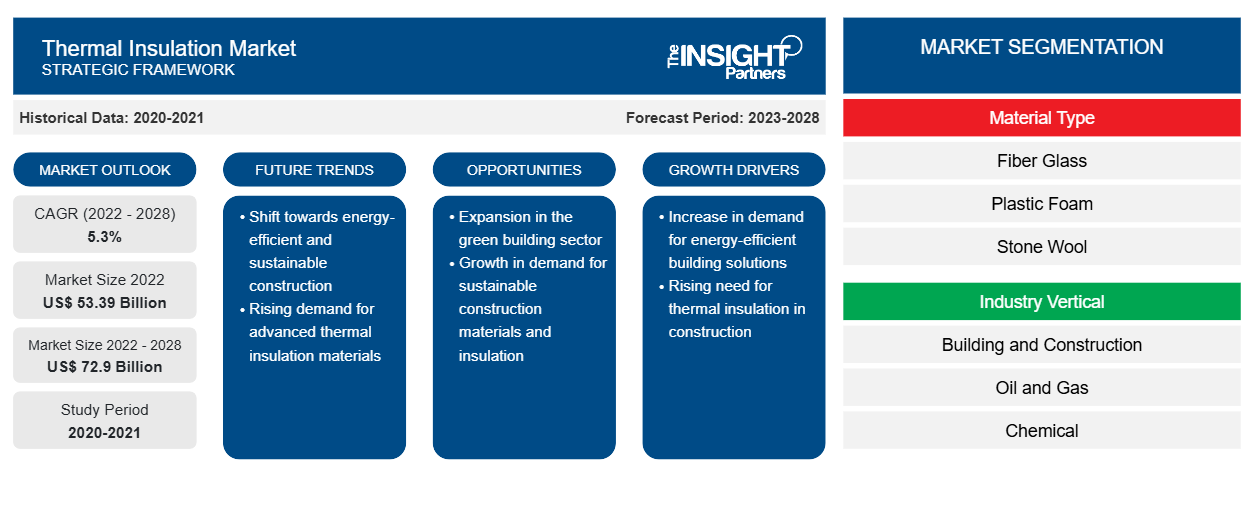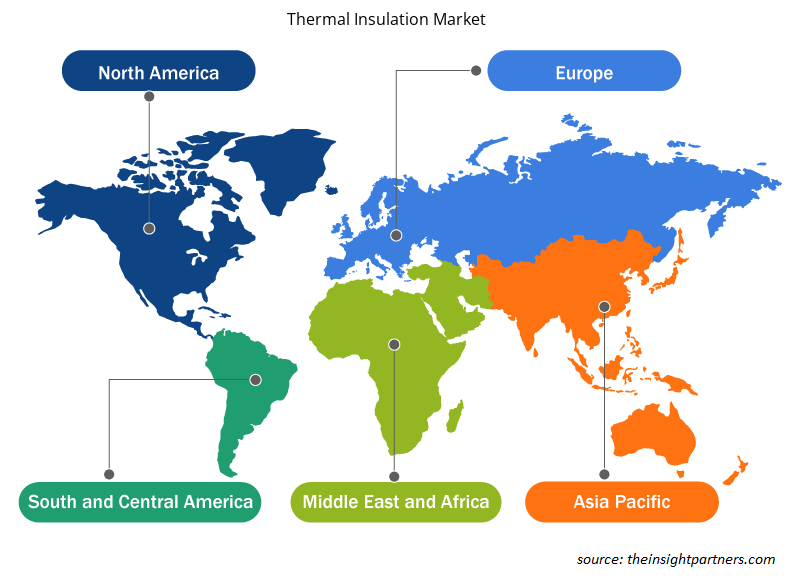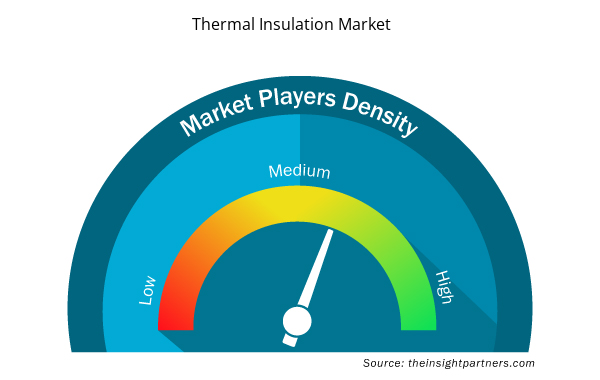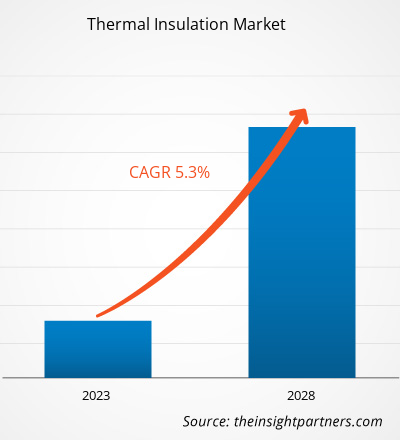The thermal insulation market is expected to grow from US$ 53.39 billion in 2022 to US$ 72.90 billion by 2028; it is expected to grow at a CAGR of 5.3% from 2022 to 2028.
The demand for thermal insulation increased owing to its advantages. It reduces energy costs and the heat transfer between two objects of different temperatures. Thermal insulation material offers insulation in which the radiative heat is reflected, reduced, and absorbed. Companies are focusing on providing lightweight products such as plastic, as it is easy to install and requires less time and effort. These factors are expected to augment the thermal insulation market growth.
The thermal insulation market is projected to witness significant growth in the coming years due to the strong presence of prominent players, such as BASF SE, Bayer AG, ROCKWOOL A/S, Johns Manville, SAINT GOBAIN S.A, Kingspan Group PLC, Dow Chemicals Company, Owens Corning, Asahi Kasei Corporation, and DuPont. A large variety of thermal insulation products gained consumers' attention. Growing awareness about the benefits of high-temperature insulation, including resistance to elevated temperatures and thermal shocks, low thermal conductivity, environmental benefits, and cost efficiency, is likely to propel the thermal insulation market growth over the forecast period.
In 2021, Asia Pacific held the largest share of the global thermal insulation market. However, North America is estimated to register the highest CAGR in the market during the forecast period. The APAC market is segmented into China, India, Australia, Japan, South Korea, and the Rest of APAC. The construction industry is one of the booming industries in APAC due to the rapidly increasing population; this ultimately leads to the high demand for thermal insulation products. Moreover, the rising disposable income levels of consumers and the growth of the middle-class population are a few of the key factors driving the thermal insulation market growth in the region.
Customize This Report To Suit Your Requirement
You will get customization on any report - free of charge - including parts of this report, or country-level analysis, Excel Data pack, as well as avail great offers and discounts for start-ups & universities
Thermal Insulation Market: Strategic Insights

- Get Top Key Market Trends of this report.This FREE sample will include data analysis, ranging from market trends to estimates and forecasts.
Customize This Report To Suit Your Requirement
You will get customization on any report - free of charge - including parts of this report, or country-level analysis, Excel Data pack, as well as avail great offers and discounts for start-ups & universities
Thermal Insulation Market: Strategic Insights

- Get Top Key Market Trends of this report.This FREE sample will include data analysis, ranging from market trends to estimates and forecasts.
Impact of COVID-19 Pandemic on Thermal Insulation Market
Before the COVID-19 pandemic, the thermal insulation market growth was primarily driven by the rising demand for buildings and construction activities. However, the market faced hurdles during the first quarter of 2020 due to business shutdown, raw material, and labor shortages, and decline in construction and transportation activities. The COVID-19 pandemic led to economic recession in the initial months of 2020, which created financial difficulties for low-income and mid-income consumers.
Moreover, due to restrictions, shutdown of many construction companies and manufacturing affected the growth of thermal insulation market. Moreover, during the pandemic, shortage of labor was a major concern for the thermal insulation industry. This led to shift towards mechanization, automation, and off-site fabrication in the thermal insulation industry.
Market Insights
Benefits of Using Thermal Insulation
Thermal insulation reduces heat movements and vapor condensation. Therefore, it prevents humidity, mold, freezing, deformation that may occur in the building and weakening of iron parts due to corrosion; and helps preservation of the building. Moreover, in various industries, huge energy saving benefits can be obtained with decreased thermal conductivity in the lining construction through the utilization of products such as BTU-BLOCK insulation.
Based on material type, the global market is categorized into fiber glass, plastic foam, stone wool, calcium silicate, cellular glass, and others. In 2021, the fiber glass segment accounted for the largest revenue share and plastic foam is expected to account for the highest growth rate over the forecast period. By industry vertical, the global market is segmented into building and construction, oil and gas, chemical, aerospace and defense, automotive, pharmaceutical, and others. The building and cocntruction segment accounted for the largest revenue share.
BASF SE, Bayer AG, ROCKWOOL A/S, Johns Manville, SAINT GOBAIN S.A, Kingspan Group PLC, Dow Chemicals Company, Owens Corning, Asahi Kasei Corporation, and DuPont are a few of the key players operating in the thermal insulation market. These companies provide a wide range of product portfolios for the market. The companies have their presence in developing regions, providing lucrative market opportunities. Market players are developing high-quality, innovative products to meet customer requirements.
Report Spotlights
- Progressive industry trends in the market to help players develop effective long-term strategies
- Business growth strategies adopted by developed and developing markets
- Quantitative analysis of the thermal insulation products market size from 2022 to 2028
- Estimation of global demand for thermal insulation
- PEST analysis to illustrate the efficacy of buyers and suppliers operating in the industry
- Recent developments to understand the competitive market scenario
- Market trends and outlook and factors driving and restraining the growth of the thermal insulation market
- Assistance in the decision-making process by highlighting market strategies that underpin commercial interest, leading to the market growth
- The size of the thermal insulation market at various nodes
- Detailed overview and segmentation of the market, as well as the thermal insulation industry dynamics
- Thermal insulation market size in various regions with promising growth opportunities
Thermal Insulation Market Regional Insights
The regional trends and factors influencing the Thermal Insulation Market throughout the forecast period have been thoroughly explained by the analysts at Insight Partners. This section also discusses Thermal Insulation Market segments and geography across North America, Europe, Asia Pacific, Middle East and Africa, and South and Central America.

- Get the Regional Specific Data for Thermal Insulation Market
Thermal Insulation Market Report Scope
| Report Attribute | Details |
|---|---|
| Market size in 2022 | US$ 53.39 Billion |
| Market Size by 2028 | US$ 72.9 Billion |
| Global CAGR (2022 - 2028) | 5.3% |
| Historical Data | 2020-2021 |
| Forecast period | 2023-2028 |
| Segments Covered |
By Material Type
|
| Regions and Countries Covered | North America
|
| Market leaders and key company profiles |
Thermal Insulation Market Players Density: Understanding Its Impact on Business Dynamics
The Thermal Insulation Market market is growing rapidly, driven by increasing end-user demand due to factors such as evolving consumer preferences, technological advancements, and greater awareness of the product's benefits. As demand rises, businesses are expanding their offerings, innovating to meet consumer needs, and capitalizing on emerging trends, which further fuels market growth.
Market players density refers to the distribution of firms or companies operating within a particular market or industry. It indicates how many competitors (market players) are present in a given market space relative to its size or total market value.
Major Companies operating in the Thermal Insulation Market are:
- BASF SE
- Bayer AG
- ROCKWOOL A/S
- Johns Manville
- SAINT GOBAIN S.A
Disclaimer: The companies listed above are not ranked in any particular order.

- Get the Thermal Insulation Market top key players overview
The "Thermal Insulation Market Analysis to 2028" is a specialized and in-depth study of the consumer goods industry with a special focus on the global thermal insulation market trend analysis. The report aims to provide an overview of the market with detailed market segmentation.
The thermal insulation market is segmented into material type, industry vertical, and geography. Based on material type, the global market is segmented into fiber glass, plastic foam, stone wool, calcium silicate, cellular glass, and others. Based on industry vertical, the global market is segmented into building and construction, oil and gas, chemical, aerospace and defense, automotive, pharmaceutical, and others. By geography, the market is broadly segmented into North America, Europe, Asia Pacific (APAC), the Middle East & Africa (MEA), and South & Central America.
Company Profiles
BASF SE, Bayer AG, ROCKWOOL A/S, Johns Manville, SAINT GOBAIN S.A, Kingspan Group PLC, Dow Chemicals Company, Owens Corning, Asahi Kasei Corporation, and DuPont are the prominent players operating in the global thermal insulation market.
- Historical Analysis (2 Years), Base Year, Forecast (7 Years) with CAGR
- PEST and SWOT Analysis
- Market Size Value / Volume - Global, Regional, Country
- Industry and Competitive Landscape
- Excel Dataset



Report Coverage
Revenue forecast, Company Analysis, Industry landscape, Growth factors, and Trends

Segment Covered
Material Type, and Industry Vertical

Regional Scope
North America, Europe, Asia Pacific, Middle East & Africa, South & Central America

Country Scope
Argentina, Australia, Brazil, Canada, China, France, Germany, India, Italy, Japan, Mexico, Saudi Arabia, South Africa, South Korea, Spain, United Arab Emirates, United Kingdom, United States
Frequently Asked Questions
Based on the industry vertical, building and construction segment accounted for the highest share of the global market in 2021. Thermal insulation materials are increasingly used in the building and construction sector as they slow heat transfer through the enclosure to reduce heat gain and loss. Thermal insulation is increasingly becoming an essential technology to reduce energy consumption in buildings by preventing heat gain/loss through the building envelope.
Increasing demand for high-temperature thermal insulation is a recent trend in the global thermal insulation market. Growing awareness about the benefits of high-temperature insulation, including resistance to elevated temperatures and thermal shocks, low thermal conductivity, environmental benefits, and cost efficiency, is likely to propel the thermal insulation market growth over the forecast period. In addition, thermal insulation can protect equipment and help achieve extraordinarily high or low temperatures with reduced accident risks.
Based on the material type, plastic foam is expected to be the fastest-growing segment during the forecast period. Plastic foams are a type of polymer that includes voids and cells within the polymers. It is a lightweight cellular foam that is increasingly used as an insulation material.
Increase in demand for lightweight thermal insulation and growth in the building and construction industry are drivers of thermal insulation. Thermal insulation material offers insulation in which the radiative heat is reflected, reduced, and absorbed. Thermal insulation is a powerful technology that is used to reduce energy consumption in buildings by preventing heat gains or losses through the building covering.
The major players operating in the global thermal insulation market BASF SE, Bayer AG, ROCKWOOL A/S, Johns Manville, SAINT GOBAIN S.A, Kingspan Group PLC, Dow Chemicals Company, Owens Corning, Asahi Kasei Corporation, and DuPont.
In 2021, Asia Pacific accounted for the largest share of the global thermal insulation market. The Asia Pacific thermal insulation market is segmented into China, India, Japan, South Korea, Australia, and the Rest of Asia Pacific. These countries are witnessing growth in various end-use industries which will boost the growth of the thermal insulation market in the region. Growing urbanization in the emerging economies of Asia Pacific has led to an increased requirement for better commercial and public infrastructure. Rural-to-urban migration in developing countries in the region is increasing the construction activity in urban areas. As urban buildings are usually more insulation intensive than those in rural areas, this will, in turn, stimulate demand for thermal insulation in residential buildings.
Trends and growth analysis reports related to Chemicals and Materials : READ MORE..
The List of Companies - Thermal Insulation Market
- BASF SE
- Bayer AG
- ROCKWOOL A/S
- Johns Manville
- SAINT GOBAIN S.A
- Kingspan Group PLC
- Dow Chemicals Company
- Owens Corning
- Asahi Kasei Corporation
- DuPont

 Get Free Sample For
Get Free Sample For